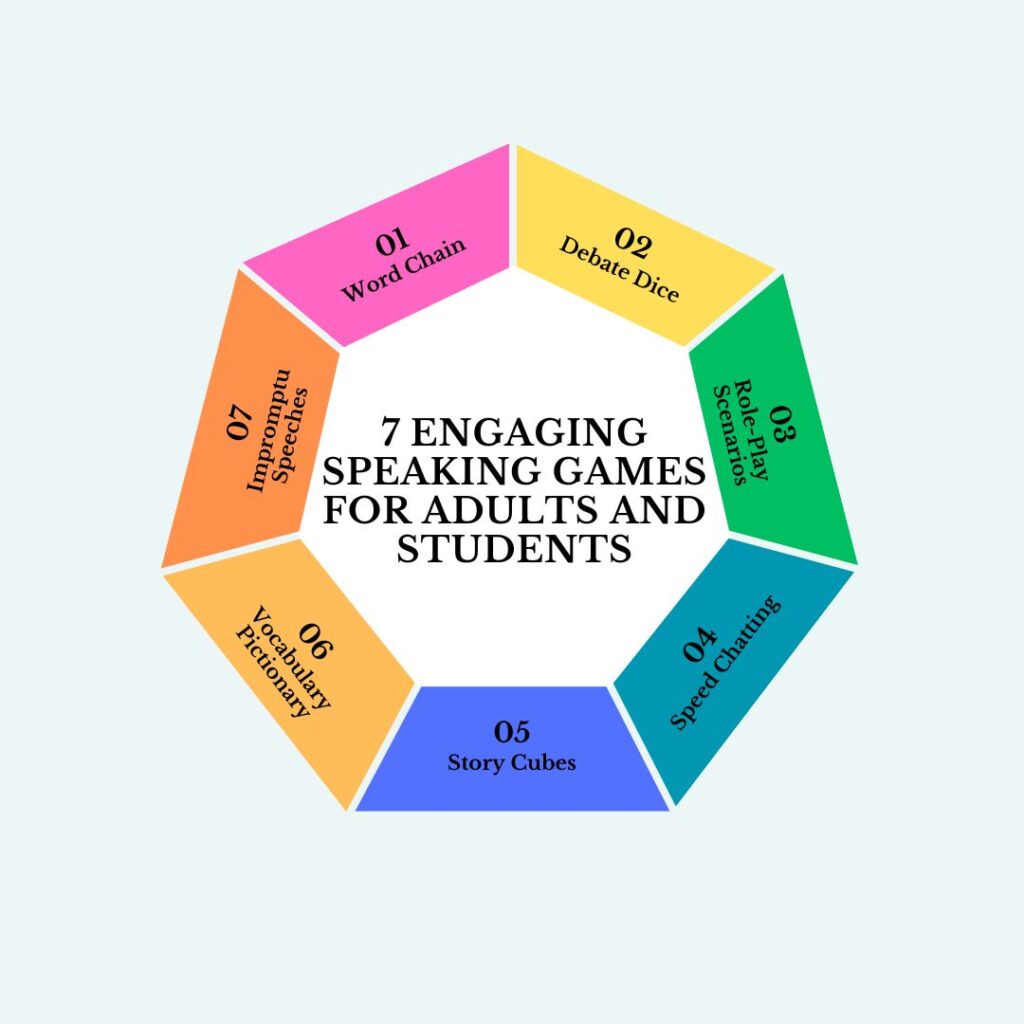Entering the landscape of language exploration, the finesse of effective communication becomes a valuable asset cutting across generations. Whether one is an individual in the stages of adulthood refining conversational prowess or a student delving into the intricacies of language acquisition, integrating interactive speaking games into the learning routine stands out as a transformative element. This blog will delve into seven captivating games meticulously crafted to elevate the art of speaking for both grown-ups and students alike.
1. Word Chain:
How to Play:
In this engaging game, participants take turns saying words linked to a specified theme. The challenge lies in each word starting with the last letter of the previous one. For instance, if the chosen theme is “animals,” the sequence could unfold as follows: “elephant – tiger – rabbit.”
Benefits:
Word Chain is more than just a game – it’s a brain workout. By encouraging participants to think on their feet, it enhances quick thinking, expands vocabulary, and fosters adaptability. Teachers working in Dr. Kishore’s Ratnam Schools in Nellore pay special attention to inculcating real-world skills like promoting problem-solving and vocabulary that shape their students into well-rounded individuals.
2. Debate Dice:
How to Play:
Grab a pair of dice, roll them, and unveil both a debate topic and the stance each participant must take. It’s like having your own mini-debate generator. The ensuing discussions allow participants to express their thoughts while honing their argumentative skills.
Benefits:
Beyond being a game of chance, Debate Dice develops valuable skills. It sharpens the ability to articulate ideas, strengthens critical thinking, and provides a playful platform for expressing opinions.
3. Role-Play Scenarios:
How to Play:
Picture a game where you get to be anyone you want – a job applicant, a café customer, or even a superhero. Role-Play Scenarios bring language learning to life by immersing participants in different, often amusing, roles. It’s like acting, minus the script.
Benefits:
More than just a fun activity, Role-Play Scenarios offer practical experience. They enhance conversational fluency, boost social skills, and provide a lively way to navigate various real-life situations.
4. Speed Chatting:
How to Play:
Imagine a game where you have a set time to chat with different partners about various topics, switching partners and topics swiftly. Speed Chatting is like a language race, challenging participants to be fluent and quick-witted.
Benefits:
Speed Chatting is more than just a fast-paced game. It helps improve spontaneity, conversational agility, and the ability to express thoughts clearly and efficiently.
5. Story Cubes:
How to Play:
Roll the storytelling dice, each side featuring different images. Participants then craft a coherent story using the images that appear. It’s like telling tales with a dash of randomness.
Benefits:
Story Cubes are a fantastic blend of creativity and language practice. They enhance narrative construction, stimulate imagination, and encourage the use of descriptive language.
6. Vocabulary Pictionary:
How to Play:
Think of classic Pictionary, but with a language twist. Instead of drawing objects, participants sketch words they’ve learned. It’s a lively guessing game that seamlessly incorporates language practice.
Benefits:
Vocabulary Pictionary isn’t just about artistic expression. It reinforces language retention, promotes teamwork, and adds an element of fun to the process of learning new words.
7. Impromptu Speeches:
How to Play:
Participants pick a topic randomly and deliver a short impromptu speech. It’s like public speaking without the pressure of extensive preparation.
Benefits:
Impromptu Speeches go beyond just speaking off the cuff. They build confidence, improve public speaking skills, and enhance the ability to organize thoughts on the spot.
As we embark on the journey of enhancing speaking skills, it’s essential to recognize the importance of a holistic education. Dr. Kishore’s Ratnam Schools, nestled in the vibrant educational landscape of Tirupati, stands as a beacon of comprehensive learning. With a commitment to nurturing not only academic excellence but also the vital skills necessary for real-world success, the school provides an environment where students thrive.
In the heart of Andhra Pradesh, Dr. Kishore’s Ratnam Schools embrace innovative teaching methodologies, encouraging students to explore and express themselves confidently. By fostering a dynamic learning atmosphere, the school equips students with the skills needed for effective communication, setting the stage for a bright future.
Conclusion:
Language learning is a journey, and speaking practice is a crucial milestone on this path. By incorporating these engaging speaking games into your learning routine, whether you’re an adult refining your language skills or a student embarking on the journey of communication, you’re taking a step toward unlocking your full linguistic potential. And as you explore these enriching language activities, consider the holistic educational approach of Dr. Kishore’s Ratnam Schools – a place where education goes beyond textbooks, nurturing well-rounded individuals prepared for the complexities of the modern world.


